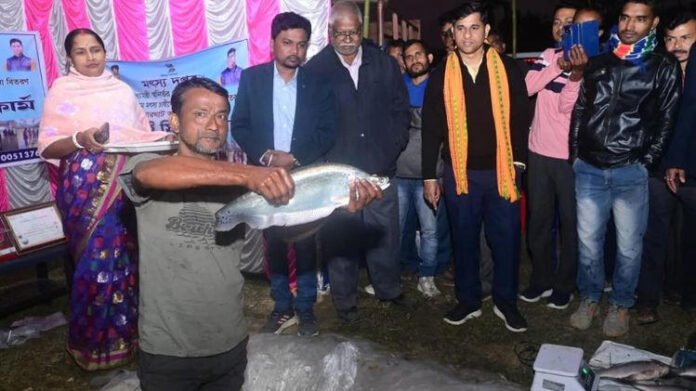As the Bengali New Year, or Poila Boishakh, approaches, the Tripura Fisheries Department has announced a special initiative to provide fish at subsidized rates to the people of the state. Aiming to make the celebrations more accessible and affordable for the local population, the department will sell a total of 6,000 kilograms of fish across various markets in Tripura. This initiative, aimed at both supporting local fishermen and ensuring that fresh fish is available for the traditional New Year feast, has garnered significant attention as people prepare for one of the most important cultural celebrations in the Bengali calendar.
The Importance of Poila Boishakh in Tripura
Poila Boishakh marks the first day of the Bengali calendar and is celebrated with much enthusiasm by the Bengali-speaking population, especially in the northeastern state of Tripura. The festival is not just a time for cultural and religious observance, but also an occasion for social gatherings, feasts, and the exchange of good wishes. Food plays an integral role in the celebrations, with many traditional Bengali dishes being prepared, among which fish is a key ingredient.
The sale of fish at subsidized rates by the Fisheries Department is seen as an effort to make this festival more enjoyable for the people of Tripura. It will ensure that families can prepare their traditional dishes, such as ‘machher jhol’ (fish curry), ‘bhaja’ (fried fish), and other Bengali seafood delicacies, without worrying about the rising costs of fish in the local markets.
Fish at Subsidized Rates: A Relief for Consumers
The decision to sell 6,000 kilograms of fish at subsidized rates comes as a relief to many in Tripura, particularly those from lower-income families. As fish prices in the state have been fluctuating due to various factors such as supply chain disruptions, demand spikes, and seasonal variations, the subsidized sale will provide consumers with high-quality, fresh fish at a price that is more affordable than what is typically available in the market.
The Fisheries Department has stated that the fish will be sold at various government-approved markets across the state, including major towns and local markets, where demand for fish is highest during the festival season. To ensure fairness, a limit will be imposed on the quantity of fish that any individual can purchase, preventing hoarding and ensuring that as many people as possible benefit from the initiative.
This initiative not only helps consumers but also provides a boost to local fish farmers and fishermen who will be able to sell their produce at government-mandated prices. It creates a positive economic cycle where both the sellers and buyers benefit from the subsidies, strengthening the local economy in the process.
Boosting Local Fisheries and Sustainability
The Tripura Fisheries Department has been working to promote sustainable fishing practices in the state, encouraging local fishermen to adopt eco-friendly methods. As part of its long-term strategy, the department has focused on enhancing fish production through various schemes and initiatives, including promoting the cultivation of fish in local ponds and ensuring that natural water bodies are preserved. This ensures that the state’s fish markets have a steady supply of fresh and healthy fish throughout the year, but particularly during festivals like Poila Boishakh.
The subsidized fish sale is part of a broader effort by the state government to support local fishermen, many of whom depend on fishing as their primary source of income. By facilitating the sale of their catch at government-set prices, the Fisheries Department not only benefits consumers but also ensures that local fish production continues to thrive, with an emphasis on sustainability.
Ensuring Access to All
One of the main objectives behind the subsidized fish sale is to ensure that fish, a primary source of protein for many people in the state, remains accessible to everyone, regardless of their financial situation. This is particularly important for the lower-income groups, who may otherwise find it difficult to afford fish during the festive season due to market fluctuations.
The tripartite approach of ensuring affordable prices, promoting local businesses, and fostering sustainable practices makes this initiative a comprehensive model for other states to consider, especially during cultural festivals that involve large-scale consumption of certain food items.
A Step Towards Food Security
By making 6,000 kilograms of fish available at subsidized rates, the Fisheries Department is also contributing to the broader goal of food security in Tripura. Ensuring that essential protein sources like fish are affordable and readily available helps alleviate food insecurity, which can often be exacerbated during festivals when demand for specific items increases.
With the support of government initiatives like these, the state hopes to tackle issues of rising food costs and the uneven distribution of food resources, which can disproportionately affect marginalized communities. This will not only help alleviate short-term challenges but will also build long-term food security and a more sustainable food system.
As Poila Boishakh draws near, the Tripura Fisheries Department’s initiative to sell 6,000 kilograms of fish at subsidized rates is a significant step toward making the celebration more inclusive, affordable, and enjoyable for all. The move benefits local fishermen, provides economic relief to consumers, and ensures that Tripura’s cultural traditions are preserved and celebrated. As the state continues to focus on sustainable fishing practices and economic support for its local communities, this initiative will likely set a precedent for future government actions during major festivals and celebrations. The subsidized sale of fish on Poila Boishakh is a powerful reminder of how state intervention can contribute to the economic and cultural well-being of a community.

